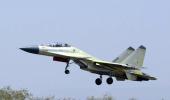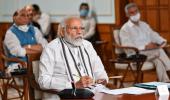Indian and Chinese armies have arrived at a 'mutual consensus to disengage' from all friction points in eastern Ladakh, in a significant development that came in the midst of escalating tension following the killing of 20 Indian soldiers in a clash at Galwan Valley, military sources said on Tuesday.

The decision to disengage the forces, locked in a bitter standoff for the last six weeks in eastern Ladakh, was taken at a nearly 11-hour-long meeting between senior Indian and Chinese commanders in Moldo on the Chinese side of the Line of Actual Control (LAC) on Monday.
The talks were held in a 'cordial, positive and constructive atmosphere' and it was decided that modalities for disengagement from all areas in eastern Ladakh will be taken forward by both the sides, the sources said while giving details of the second Lieutenant General-level meeting.
"There was a mutual consensus to disengage. Modalities for disengagement from all friction areas in eastern Ladakh were discussed and will be taken forward by both the sides," said a source.
A Chinese Foreign Ministry spokesperson in Beijing said the two sides had a 'candid and in-depth exchange of views on the outstanding issues and agreed to take necessary measures to cool down the situation'.
Sources said the ground commanders will hold a series of meetings in the next couple of weeks to finalise the detailed framework of disengagement.
In the meantime, Army Chief General M M Naravane reviewed the Army's overall combat readiness in the Ladakh region with the ground commanders soon after arriving in Leh on a two day visit.
He will visit various forward areas during his stay.
Separately, in a subtle message aimed at China, External Affairs Minister S Jaishankar said leading voices of the world must be exemplars in 'every way' and they need to respect international law while recognising the interests of partners.
Jaishankar made the remarks at a virtual conference of the Russia-India-China trilateral in the presence of Chinese Foreign Minister Wang Yi and Russian Forein Minister Sergei Lavrov.
"This special meeting reiterates our belief in the time-tested principles of international relations. But the challenge today is not just one of concepts and norms, but equally of their practice," Jaishankar said.
"The leading voices of the world must be exemplars in every way. Respecting international law, recognising the legitimate interests of partners, supporting multilateralism and promoting common good are the only way of building a durable world order," the minister said without naming any country.
When asked about Sino-India tension, Lavrov ruled out mediating between the two countries saying they do not need any kind of assistance to resolve their disputes.
"As soon as the border incidents took place, meetings were held and contact was established between the military command on the ground and the foreign ministers," Sputnik News quoted Lavrov as saying.
Indian and Chinese militaries are engaged in a bitter standoff in Pangong Tso, Galwan Valley, Gogra Hot Spring and a number of other areas in eastern Ladakh for the last six weeks.
The Indian delegation at Monday's talks was led by 14 Corps Commander Lt Gen Harinder Singh while the Chinese was headed by the Commander of the Tibet Military District Maj Gen Liu Lin.
The first round of the Lt Gen talks was held on June 6 during which both sides finalised an agreement to disengage gradually from all standoff points beginning with Galwan Valley.
However, the situation along the border deteriorated following the Galwan Valley clashes on June 15 as the two sides significantly bolstered their deployment in most areas along the 3,500-km de facto border after the incident.
On Sunday, the government gave the armed forces 'full freedom' to give a 'befitting' response to any Chinese misadventure along the LAC.
The Army has already sent thousands of additional troops to forward locations along the border in the last one week.
The IAF has also moved a sizable number of its frontline Sukhoi 30 MKI, Jaguar, Mirage 2000 aircraft and Apache attack helicopters to several key air bases including Leh and Srinagar following the clashes.
After the Galwan Valley clash, the two sides held at least three-rounds of Major-General-level talks to explore ways to bring down tension.
In the Lt Gen talks, the Indian delegation strongly raised the 'premeditated' assault by Chinese troops on Indian soldiers in Galwan Valley.
The Indian side also suggested bringing down the number of troops by both sides in their rear bases along the LAC, people familiar with the issue said.
It is learnt that both the meetings -- June 6 and June 22 -- were sought by the Chinese military.
The situation in eastern Ladakh deteriorated after around 250 Chinese and Indian soldiers were engaged in a violent face-off on May 5 and 6. The incident in Pangong Tso was followed by a similar incident in north Sikkim on May 9.
Prior to the clashes, both sides had been asserting that pending the final resolution of the boundary issue, it was necessary to maintain peace and tranquillity in the border areas.










